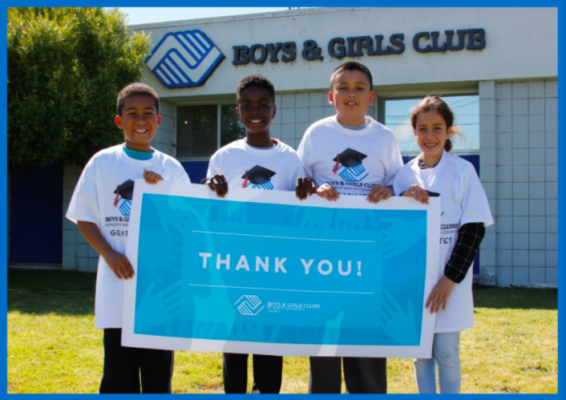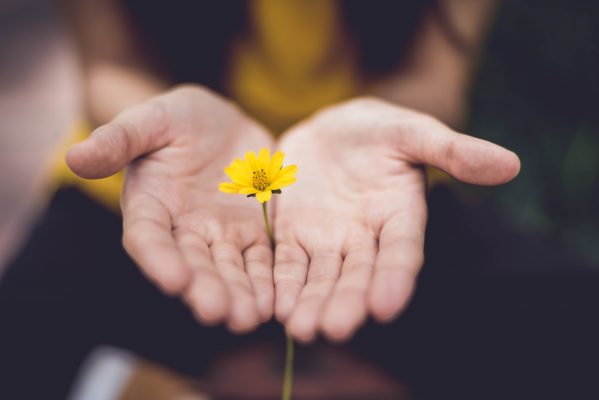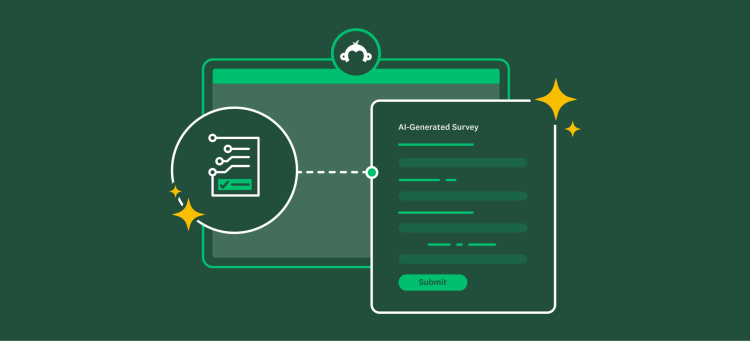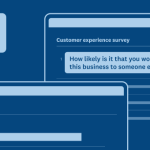Once, a journalist asked the beloved children’s show host Fred Rogers (Mr. Rogers) how to reassure children during difficult times. He said, “When I was a boy and I would see scary things in the news, my mother would say to me, "Look for the helpers. You will always find people who are helping.” In the midst of the coronavirus crisis, there are a lot of helpers.
SurveyMonkey customers have been using our products to do everything from tracking patient symptoms (in healthcare), to checking in on employees’ mental health, to assessing local community needs. Businesses and organizations of all sizes are using feedback to better support their communities. It’s been truly inspiring to see.
Here, we’ve collected some of the most heartening stories, which we’ll continue to update regularly as new ones come in. Sometimes building a better world starts with asking the right questions.
American Red Cross screens potential plasma donors to save lives
If you’re following the development of the healthcare response to coronavirus, you might have read a lot recently about antibodies—blood proteins that the body produces to fight off foreign entities, like viruses. People who have successfully recovered from the coronavirus have antibodies in their blood plasma that may help save coronavirus patients who are currently in critical care. That’s where the Red Cross has come in to help.
The Red Cross is using SurveyMonkey technology to screen people who have recovered from the coronavirus and are interested in donating, through redcross.org.
It’s impossible to overstate how meaningful this work is. This campaign, and all the Red Cross work that goes along with it, can save innumerable lives.
“We are grateful to SurveyMonkey for helping us to efficiently gather information to identify and qualify from individuals who have recovered from COVID-19 and have the necessary antibodies to participate in this effort, said Jennifer Adrio, Regional CEO of the American Red Cross Northern California Region. "During this uncertain time, the American Red Cross has adapted to meet the extraordinary challenges of this coronavirus pandemic and fulfill our lifesaving mission to alleviate suffering as we confront an emergency unlike any we have faced in a century.”
The Red Cross encourages individuals who have fully recovered from COVID-19 to check their eligibility to donate convalescent plasma by visiting their site. They recognize that many want to provide support during this pandemic and continue to work aggressively to fulfill these emerging needs for patients across the country through their humanitarian mission.
J.P. Morgan mobilizes their workforce to support small businesses and Feed the Frontline
Certain members of society have always been heroic—like the doctors, nurses, firefighters, paramedics, police officers, environmental service crews and many more who put their own health at risk to help save others. In the era of coronavirus, these people have had to rise to even higher levels of bravery, tirelessness, and selflessness. At the same time, local businesses have been suddenly cut off from their customers, leaving many financially reeling. The Analyst & Associate Council within the Corporate & Investment Bank at J.P. Morgan wanted to help address both.
The group launched an initiative called “Feed the Frontline”, in which employee volunteers provide meals to those local heroes fighting the virus on the ground. They use surveys both to recruit volunteers internally and to receive nominations for frontline workers to support.
With around 100 volunteers coordinating deliveries, the JPM team has already provided meals to more than 2,000 frontline workers across 17 states. Deliveries have been made across hospitals, police departments, nursing homes, testing sites, to late night shift workers and environmental service crews. The group has been humbled by the incredible sense of community the initiative has fostered among junior employees at the firm and most notably, at the heartwarming messages from restaurants thanking them for the business and frontline heroes remarking on the deep appreciation for these small acts of kindness. One hero even went so far as to remark:
Over the past several weeks, our days here in the hospital have been filled with emotion. The extensive loss of life within our very walls has been daunting. We walk our halls, and care for our patients with surgical masks and face shields, to an extent we've never experienced. We are in a figurative war with an unseen enemy, all of us warriors wounded to a varying degree. The biological effect of this virus is measurable, cases, deaths, and recovery rates. The psychological toll is not. We often feel entirely alone, struggling for normalcy beyond our hospital environment.
Yet, the COVID positive patients we have discharged brings an invigorating hope. We are figuring it out. We are fighting. We draw strength from unity and the simple joys in our daily life. Simple joys like a good meal. While it may seem small, your generosity had brightened the day of [our] team. Our staff lounge was filled with laughter, the type of laughter I haven't heard in a while. Not a single team member passed me without proclaiming how thankful and meaningful today's lunch was.
Today, you cared for our caregivers. Today, you brightened our day so that we may brighten the day for the ill we care for, and we are incredibly grateful.
The Boys and Girls Club of N. San Mateo supports their community through hard times

For close to 70 years, Boys & Girls Clubs of North San Mateo has played a pivotal role in the lives of underprivileged kids. It’s a community gathering place, a center of learning, a hub of mentorship and leadership, and home to a myriad of life-enhancing, holistic youth development programs.
The coronavirus outbreak and the new sheltering and social distancing guidelines disrupted that work. In order to check in on the members of their community, Boys & Girls Clubs of North San Mateo sent a survey to the parents of their members to identify areas of priority need and where people were struggling. The club used this data to understand what they could do to support children and their families at home.
The responses made it clear that the community’s needs were growing exponentially. Using the data to inform their decisions, the club immediately developed short and long-term strategies to address these new needs. The first steps? Setting up a drive-through food distribution center in their parking lot for families that were struggling and a day-long childcare program for Essential Services workers.
“It’s hard to believe that the safe-at-home recommendations were made more than a month ago, and we are looking at another month or more of the same. In these short few weeks, Boys & Girls Clubs of North San Mateo County has worked through the shock of the epidemic to attend to the needs of our families and establish deeply-needed community services like food distribution to needy families.
COVID-19 pandemic response is our #1 priority. We are an organization that is deeply embedded in our neighborhoods and therefore well-positioned to help our communities overcome and rebound from this crisis. We’re doing our best to balance these unprecedented circumstances and appreciate all the support we’ve gotten as we continue to support the community.”
The Rhode Island Department of Health tracks symptoms and trends to understand and address the virus better
One of the best weapons that we have against the coronavirus is information. The more we know about how it operates, the more effectively we’ll be able to contain and protect against it. With that in mind, Rhode Island Governor Gina Raimondo and the Rhode Island Department of Health decided to start asking questions.
Rhode Island is using SurveyMonkey with Salesforce to monitor people who have been exposed to coronavirus or tested positive, in order to understand how the disease is spreading and the effect it’s having on its citizens.
To be clear, this isn’t surveillance: respondents opt in to the study to help the state research the disease and plan for prevention. Rhode Island’s health department aggregates the data and looks for trends in transmission and symptoms. The goal is to learn more about how the virus is impacting the community and provide support for the areas that need it most.
The survey research could also play a role in helping find solutions. Who is suffering? What are their symptoms? How severe are those symptoms and how has long each one lasted? Are there commonalities among people who got the sickest? The responses could help inform policy, unearth new breakthroughs, and even save lives.
In a message to Rhode Island citizens, Governor Raimondo said, “The name of the game here is data...That data is going to be like gold for us who are trying to manage the crisis, especially after the economy opens, so we can better understand it. I’m urging you to opt in. I’m urging you to say yes, take the surveys. It will help us keep you healthy, and your family healthy, and your workplace healthy, and get everybody back to work, and keep everybody safe.”
The town of Breckenridge uses SurveyMonkey Apply to ease financial tension for small businesses

Breckenridge, Colorado is a top U.S. ski destination—which means that winter and early spring are supposed to be their busiest months. For obvious reasons, things worked out differently this year—but the small businesses that support the town depend on that annual spike to make ends meet for the rest of the year. Breckenridge town officials decided to take quick, proactive action to help these businesses, using SurveyMonkey Apply.
The town council approved a $1M grant fund to help local businesses with immediate rent support, and worked with the community development department to roll it out immediately—getting a full program live in just 4 days. Twenty-four hours after launching the program, the town of Breckenridge had 76 applications in progress, 16 in review, and 10 already approved for funding.
The program is already making a difference. One local small business owner said, “I just wanted to take a moment and say thank you for putting this program together for our local businesses so quickly. I was a bit concerned that the application process would be lengthy and even frustrating (which we don't need any more of right now!), but it was seamless.”
UN org and partners in South Africa perform critical research at scale
The ability to collect data, especially in countries where access to testing is limited, is critical for understanding the impact of the virus. Data helps identify infection hotspots and communities at risk, target testing efforts, drive heightened vigilance, and prevent the spread of disease.
In an effort to help governments, health care systems ,and citizens get a clear picture of their respective situations and make informed decisions, Slalom, the GSF, UNITAR, and the University of Cape Town (with the support of the Rali & Makentse Mampeule Foundation) developed an symptom assessment on SurveyMonkey. The assessment is launching in South Africa as a pilot project, with the expectation that it may be expanded to other countries that have need.
The assessment has already been translated into in 4 languages and is also seeing demand from other countries. As the application gains traction, it will:
- Provide residents of countries that do not have the resources for testing the ability to do a self-assessments.
- Stretch the medical resources in countries with shortages by identifying hotspots to inform the distribution of equipment and resources.
- Combat the second and third waves of the COVID-19 by providing accurate aggregated data to governments to help inform policy decisions.
This work is imperative in supporting critical decisions about where and when limited resources need to be deployed, and what policies need to be put in place to limit the spread of the disease while balancing economic needs.
Salesforce Ventures checks in on fledgling portfolio companies
The coronavirus has brought challenges for small businesses almost across the board, including startups. Salesforce Ventures (the venture capital branch of Salesforce) has a portfolio of companies ranging from early-stage businesses (seed round) to established companies—any of which might have to figure out new ways to do business, support employees, and plan for future. The firm decided to use SurveyMonkey to check in on their portfolio members and understand how to support them better—and wrote about it on Medium.
Their research included some optimistic findings:
- 88% of respondents say they are more optimistic about the efficacy of remote work than they were before.
- 80% are providing additional resources to employees.
- 84% are taking steps to adapt their strategies to compensate for the changes in the economy.
According to Managing Partner Matt Garrett, “Despite what is sure to be a difficult period in the near term, we continue to be optimistic about the long-term future of enterprise technology and the SaaS ecosystem and believe in these industries' ability to accelerate efficiency and growth. Someday, things will be better. Until then, let’s help each other work it out.”
Harvard researcher Dr. Deirdre Barrett researches the virus’s effect on dreams
Our society has never been more focused on health, but it’s important to remember that health isn’t limited to the physical body. The coronavirus is taking its toll on mental health as well, something that Harvard researcher Dr. Deirdre Barrett brought to light with her heavily publicized new work on dreams.
Dr. Barrett created a survey titled, “Dreams related to the covid-19 coronavirus pandemic,” which asks respondents a few basic questions, then asks them to share their dreams. In three and a half weeks, she got over 1,800 responses.
She analyzed dreams from two groups: a general population and a subset of healthcare workers. Among the general population, dreams in the age of coronavirus focus on fears and anxieties—trying desperately to get to a hospital, having a loved one test positive, coughing frantically. There were also 18 separate dreams about insects, which Barrett says is because it is common to substitute an image for a word with the same meaning—in this case “bug” (meaning illness) turns into “bug” (insect).
Among healthcare workers, the dreams were still more sobering: most of the respondents dreamt about trying to save people and failing and, heartbreakingly, about giving the virus to their own family members.
The takeaway from the research is clear: these are hard times for everyone, and they call for protection of our psyches as well as our bodies.
The more knowledge we have, the easier it is to build a better world. We’re honored to be helping organizations like these do such awesome work.
Are you doing good work of your own during the coronavirus crisis?
Tell us about it. We'd love to share your story.



